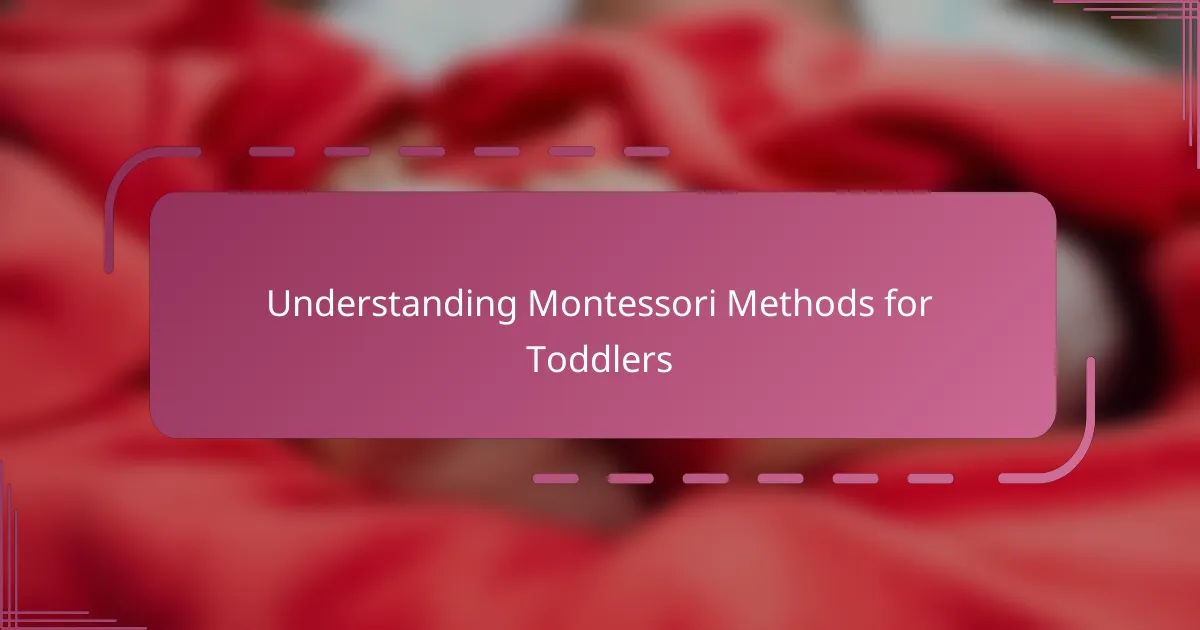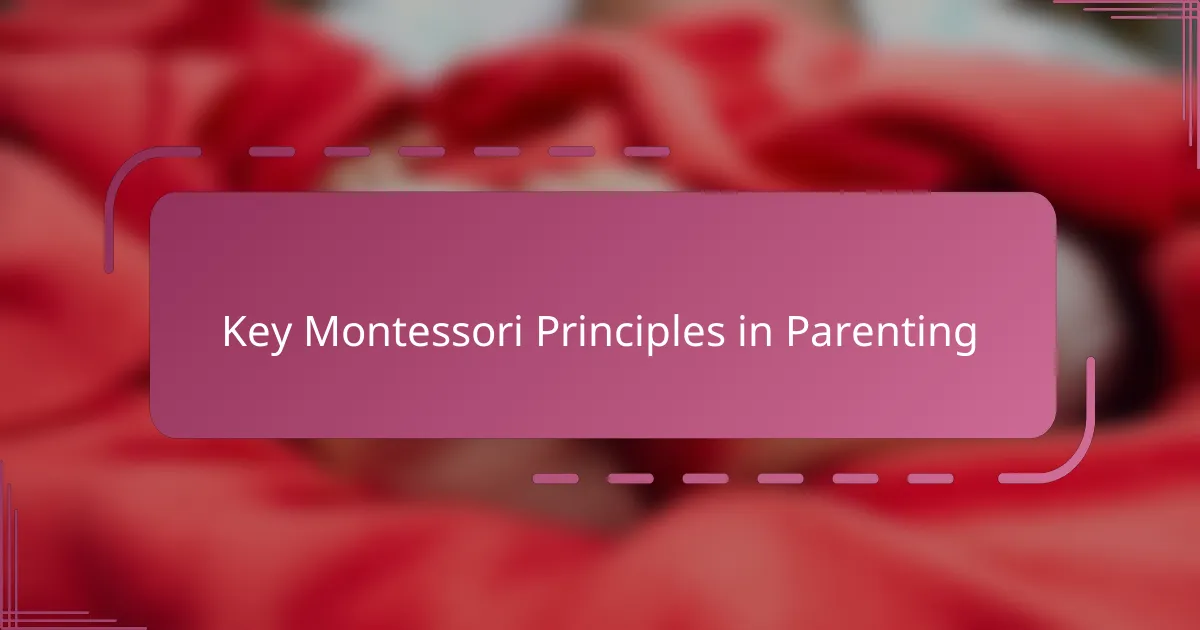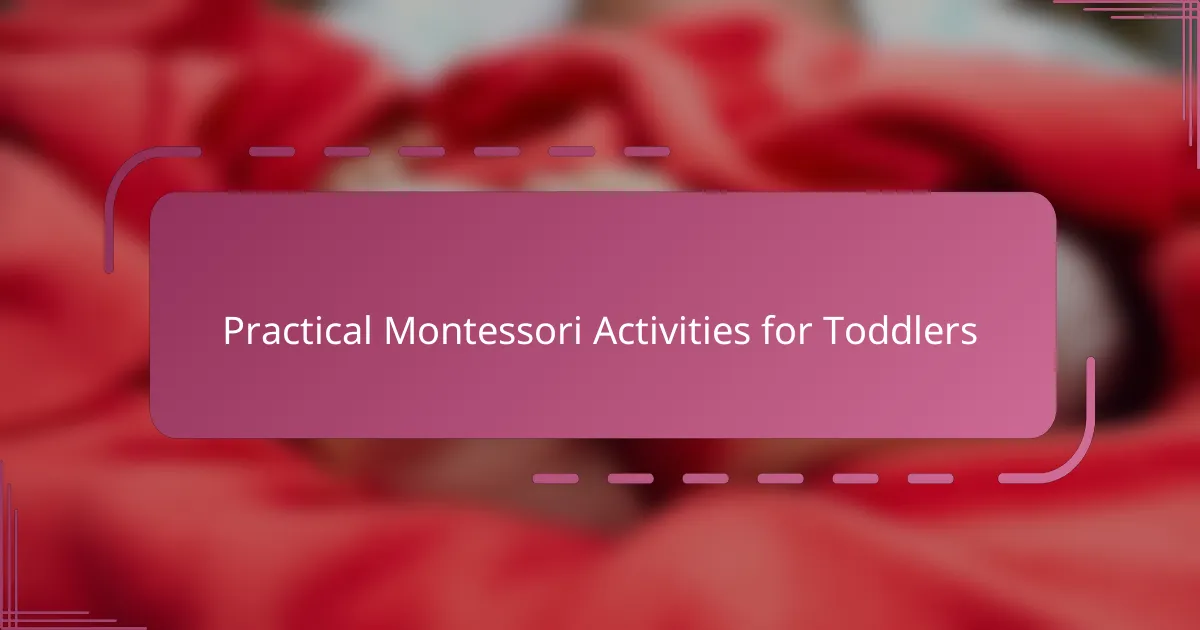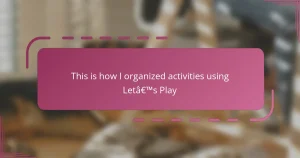Key takeaways
- The Montessori method emphasizes nurturing a toddler’s independence and natural curiosity through hands-on, purposeful activities.
- Creating a prepared environment with accessible materials fosters exploration and builds confidence in toddlers.
- Encouraging children to tackle tasks by themselves, even if imperfect, empowers them and enhances self-esteem.
- Patience and gentle guidance help toddlers overcome challenges, allowing them to learn resilience and problem-solving skills.

Understanding Montessori Methods for Toddlers
The Montessori method for toddlers centers on nurturing their natural curiosity and independence. I found that by observing my child’s interests rather than following a rigid schedule, I could create moments where learning felt effortless and joyful. Have you ever noticed how toddlers seem to absorb everything when given the freedom to explore at their own pace?
From my experience, the emphasis on hands-on, purposeful activities really helps toddlers develop concentration and self-discipline. Instead of directing every step, I learned to step back and provide simple tools that matched my child’s abilities, which made a surprising difference in their confidence. It’s remarkable how small tasks, like pouring water or sorting objects, turn into big achievements in their eyes.
What struck me most about Montessori was its respect for the toddler’s autonomy. It challenged me as a parent to trust my child’s instincts and follow their lead. This shift wasn’t always easy, but it deepened our connection and taught me patience in a way I hadn’t expected. Have you tried leaning into your toddler’s natural drive to learn and witnessed their blossoming independence?

Key Montessori Principles in Parenting
One of the most important Montessori principles I embraced was respecting my toddler’s independence. Allowing my child to choose simple tasks, like picking out clothes or tidying up toys, fostered a sense of responsibility. Have you seen how empowering it is when toddlers realize they can do things on their own?
I also learned the value of a prepared environment—setting up child-sized furniture and accessible materials to encourage exploration without constant [censured] intervention. This setup felt like giving my toddler keys to unlock their own world, making learning both inviting and manageable. It made me step back and watch with pride as they problem-solved and experimented independently.
Another principle that resonated deeply with me was following the child’s natural interests instead of imposing activities. Sometimes, this meant slowing down and getting curious about what truly captivated my toddler’s attention. When I aligned our daily routine with their rhythms and passions, I noticed their enthusiasm and focus blossom in a way no forced lesson could match. Have you tried simply observing what sparks your child’s joy before stepping in?

Setting Up a Montessori Environment at Home
Creating a Montessori environment at home started with rethinking our space from my toddler’s point of view. I remember lowering shelves and choosing natural, uncluttered materials so my child could easily reach and select items independently. It was amazing to see how just a few thoughtful changes invited exploration and confidence without me having to say a word.
One of the biggest shifts for me was committing to order and simplicity. I learned that toddlers thrive when their environment isn’t overwhelming, so each activity had its own place and purpose. Have you noticed how much calmer and more focused your child can be when toys and tools are limited to what’s just right for their current development?
I also made sure the furniture and tools were sized perfectly for my little one—tiny chairs, a low table, and utensils that fit small hands felt like a true invitation to participate fully. Watching my toddler pour water or tidy up became moments filled with pride and joy, because the space encouraged them to do it all on their own terms. How often do we get to see that kind of proud independence at home?

Practical Montessori Activities for Toddlers
One practical activity that truly captured my toddler’s attention was simple pouring tasks using small pitchers and cups. I remember how focused and proud they were as they carefully transferred water without spilling. Have you ever seen a toddler light up with pride just from mastering such a basic skill? It’s those little wins that build their confidence in amazing ways.
Another favorite in our routine was sorting objects by color or size. I found that offering just a handful of items kept the task from feeling overwhelming, and my toddler eagerly repeated the activity multiple times. It amazed me how this simple activity not only sharpened their focus but also introduced early math concepts in a playful way. What small, hands-on activities have you noticed spark that kind of curiosity in your child?
I also incorporated everyday life skills, like folding napkins or wiping tables, which gave my toddler a genuine sense of participation in our family routine. Watching them imitate these actions with such earnestness touched me deeply—it was more than just play; it was learning responsibility. Have you noticed how including your toddler in daily tasks can strengthen both their skills and your bond?

Encouraging Independence Through Montessori
Encouraging independence through Montessori means giving toddlers the space to do things by themselves, even if it takes a little longer or gets a bit messy. I remember handing my child a small broom and watching with pride as they insisted on sweeping the floor all alone—it wasn’t perfect, but that effort was pure empowerment. Have you ever felt that quiet joy when your toddler insists on taking charge, proving they’re capable in their own right?
I found that reducing my urges to step in immediately was one of the hardest but most rewarding parts of fostering independence. When I resisted the temptation to fix a spilled snack or zip a jacket, my child gained confidence by figuring it out solo. It’s amazing how those small victories build their self-esteem and willingness to try new challenges.
Another thing that really struck me was how independence grew naturally when I trusted my toddler’s timing and abilities. By setting up a space that invited their participation without pressure, I saw my child eager to explore and master tasks. Have you noticed how kids light up when they realize they can manage on their own? That’s the magic of Montessori independence in action.

Overcoming Challenges Using Montessori Techniques
When challenges came up, like frustration during tricky tasks, I leaned on Montessori’s focus on patience and gentle guidance. Instead of jumping in to solve problems, I encouraged my toddler to try again, reminding myself that the struggle is part of their learning process. Have you ever felt that bittersweet mix of wanting to help but knowing that letting your child figure things out builds resilience?
I also found that breaking down complicated activities into smaller, manageable steps made a world of difference. For instance, when my child struggled with buttoning a shirt, we practiced one button at a time until mastery felt achievable. That slow, steady approach transformed both their confidence and my own as a caregiver.
Sometimes, simply observing and adjusting to my toddler’s mood and energy helped me overcome roadblocks. On days when they needed a break or a change of activity, I didn’t push but followed their cues, which kept frustration at bay and learning enjoyable. Have you noticed how a little flexibility can turn what seems like a setback into a breakthrough?


